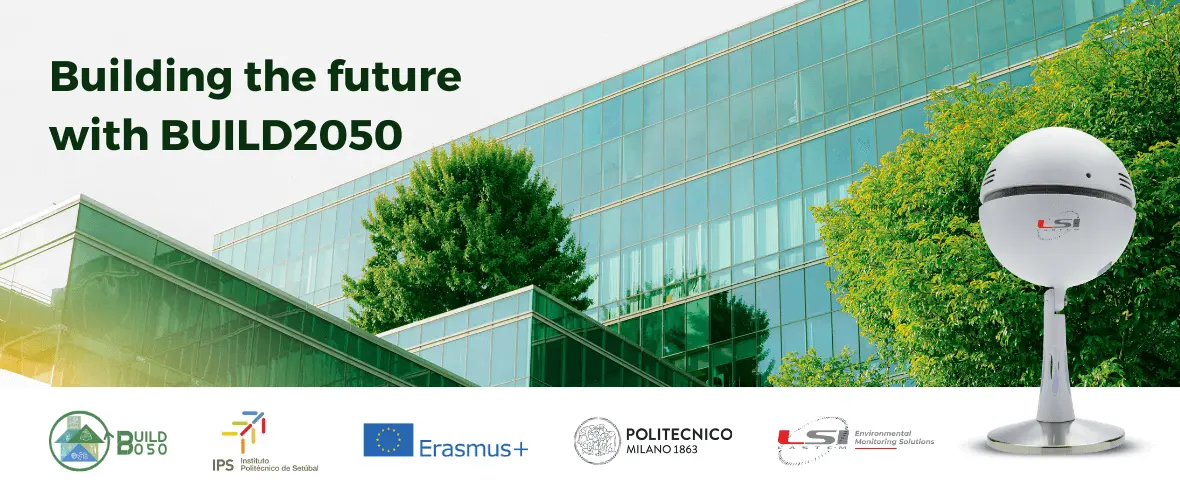Building the future with BUILD2050: LSI LASTEM as associated partner

The construction industry is now projected towards a future characterized by innovation and sustainability. In this context of change, LSI LASTEM participates as an associated partner in the interesting European project BUILD2050, financed by the Erasmus+ program of the European Union (Call 2021 Round 1 KA2 KA220HED – Cooperation partnerships in higher education) pursuant to agreement no. 2021-1-PT01-KA220-HED-000032138. This is an ambitious initiative that aims to redefine the building landscape of the future.
In this article, we will explore the details of the project and the role that LSI LASTEM, together with the other partners, will play in creating a sustainable, technologically advanced and cutting-edge future by 2050.
The European Union’s challenge for 2050: decarbonisation of the economy
The European Union has a long-term strategy to lead global action against climate change. The central goal is to achieve net-zero greenhouse gas emissions by 2050 through a transition that is socially just and economically efficient.
In this context, the circular economy emerges as a significant challenge for the BUILD2050 project. The adoption of sustainable building practices and the encouragement of a circular model that promotes the reuse, recycling and responsible management of resources become fundamental to achieve the European Union’s environmental objectives and address the challenge of climate change effectively.
This transition requires not only global climate action but also a significant increase in technological innovations across sectors, including construction. Buildings, in particular, play an important role in this process, as they must become more sustainable, promoting environmental commitment and health.
BUILD2050: a necessity and an opportunity
The BUILD2050 initiative constitutes a tangible response to the challenge posed by the European Union. The project aims to create a course for technicians that prepares them to design the buildings of the future, helping to reduce emissions and achieve the goal of zero emissions. In an era where sustainability is key, Europe needs qualified professionals ready to face this challenge.
The project is aimed at recent graduates looking for specialisation, professionals wishing to improve their skills and local and regional politicians. The latter play a key role as they can be the ones who lead the implementation of the building regulation of the BUILD2050 project.
The project partners
The associated partners: who they are and what they do
Within this brilliant project, there are so-called “associate” partners invited by the partners of the consortium that wrote and won the project. They come from various European countries and have different backgrounds in the construction sector. These partners include universities and research centers, regional and national agencies, municipalities, entrepreneurs, companies and other institutions.
The BUILD2050 project requires associated partners to contribute to the dissemination of the training program and project results, expand the collaboration network, provide support in content evaluation and actively participate in the challenges faced by the trainees.
Digitization of buildings and LSI LASTEM
A key aspect of the project is the creation of eight training courses designed to prepare future professionals in the field of sustainable construction:
Course 1: “Innovative and transnational teaching methodologies applied to BUILD2050” IPS;
Course 2: “Zero Energy and Positive Energy Buildings towards the full decarbonization” NKUA;
Course 3: “Circular water management in Buildings” IPS;
Course 4: “(Innovative Construction) Materials” – UNIBO;
Course 5: “Digitization of Buildings” – POLIMI;
Course 6: “Sustainable, Healthy and Regenerative Construction” – UNIBO;
Course 7: “Circular Economy and LCA methodology applied to construction” – SGGW and POLIMI;
Course 8: “Innovative Business Models based on Circular Economy in Construction” – NKUA.
Among these courses, we find the fifth, entitled “Digitization of Buildings”, which sees the active participation of LSI LASTEM. This course focuses on the collection, management and use of building data, introducing students and professionals to modern data management technologies and methodologies. This is a highly specialized course, designed to prepare participants to face emerging challenges in the construction sector.
LSI LASTEM, invited by the Energy Department of the Polytechnic University of Milan, will enrich the training experience of future professionals through the presentation of the innovative Sphensor sensors and highlighting the importance of environmental and microclimatic measures in the context of the digitalization of buildings.
Conclusions and future challenges
BUILD2050 represents a significant step towards a sustainable future, where buildings are at the heart of the fight against climate change. Thanks to the project partners, it is possible to build the future, training minds and providing the skills necessary to create healthier, more sustainable and cutting-edge buildings in Europe and beyond.
